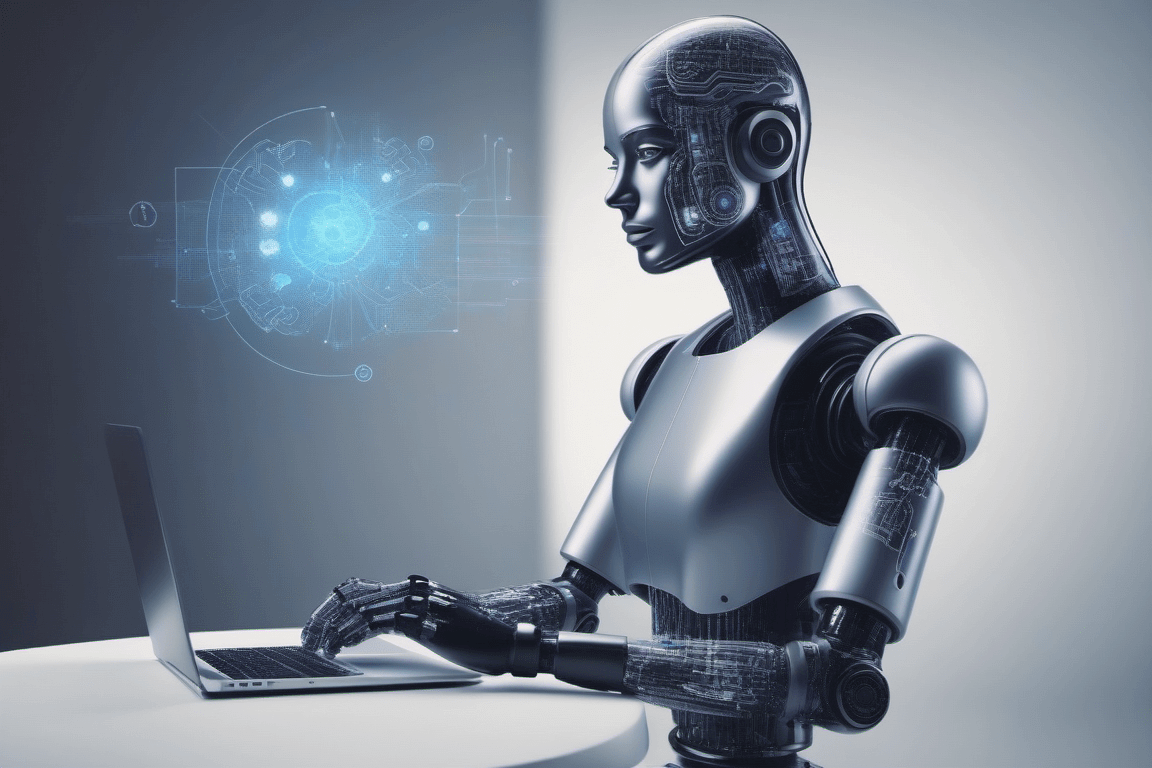

Explore how Artificial Intelligence is revolutionizing industry norms in business. Learn about AI’s transformative impact on strategies, operations, and the future of industries.
In an era where technology dictates the pace of change, Artificial Intelligence (AI) emerges as a cornerstone in the redefinition of business landscapes. From small startups to multinational corporations, AI is not just an add-on but a fundamental pillar driving innovation and efficiency. The conversation around AI in business is no longer about whether it should be adopted, but rather how swiftly and effectively it can be integrated to revolutionize industry norms.
Imagine a world where decisions are made not on gut feelings but on data-driven insights, where customer experiences are so personalized they feel magical, and operational efficiencies are not just improved but transformed. This is the world AI is creating in the realm of business. But what does this entail for businesses today? How is AI reshaping the very fabric of industries? In this exploration, we dive into the transformative impact of Artificial Intelligence in business, unveiling how it’s not just changing the game but also setting new rules for success in the corporate world.
 The Rise of AI in Business
The Rise of AI in BusinessBefore delving into its impact on business, it’s crucial to understand what Artificial Intelligence is. At its core, AI involves machines and systems capable of performing tasks that typically require human intelligence. These tasks include learning, problem-solving, pattern recognition, and decision-making. Over the years, AI technology has evolved from simple machine learning algorithms to complex neural networks, mimicking the human brain’s ability to learn and adapt.
The integration of AI into business isn’t just a trend; it’s a significant shift in how companies operate. Initially, AI’s role in business was confined to research labs and theoretical frameworks. However, with advancements in technology and data analytics, AI has moved to the forefront of business strategy and operations. Today, businesses of all sizes leverage AI for various purposes, ranging from automating mundane tasks to driving innovation and strategic decision-making.
What marks this era as the golden age of AI in business is the convergence of big data, advanced algorithms, and immense computational power. This convergence has enabled AI to analyze vast amounts of data, learn from it, and make predictions or decisions at a speed and accuracy that humans cannot match. This capability has opened new avenues for businesses, transforming them from data-generating entities into data-driven decision-makers.

One of the most visible applications of AI in business is in enhancing customer experiences. AI-driven chatbots and virtual assistants have revolutionized customer service, providing 24/7 support and personalized interactions. Beyond customer service, AI is also instrumental in tailoring marketing efforts. By analyzing customer data, AI can predict buying behaviors and preferences, enabling businesses to offer highly personalized marketing campaigns.
AI’s impact on business operations is profound. In supply chain management, AI algorithms optimize logistics, forecasting demand, and inventory needs with remarkable accuracy. In manufacturing, AI-driven robots and smart systems increase efficiency, reduce errors, and enhance safety. AI also plays a crucial role in cybersecurity, using pattern recognition to detect and prevent security breaches.
Perhaps one of the most transformative applications of AI in business is in decision-making. With the ability to analyze massive datasets, AI provides insights that were previously inaccessible. This capability allows for more informed, data-driven decisions. In finance, for instance, AI algorithms can predict market trends and assist in investment decisions. In human resources, AI can help in analyzing employee performance data to make better hiring and management decisions.
AI is not just about improving existing processes; it’s also about innovation. Businesses are using AI to create new products and services that were once thought impossible. From AI-driven health diagnostics to personalized education platforms, the possibilities are endless. This ability to innovate rapidly and effectively is giving businesses that embrace AI a distinct competitive advantage.

One of the most significant benefits of AI in business is the remarkable increase in efficiency and productivity. AI systems can process and analyze data at a speed that no human team can match. This rapid processing leads to quicker decision-making and problem-solving, reducing downtime and increasing output. Automation of repetitive tasks also frees up human employees to focus on more complex and creative tasks, further enhancing productivity.
AI empowers businesses to shift from intuition-based decisions to data-driven ones. With the ability to analyze large volumes of data, AI provides insights that can guide strategic planning and operational adjustments. This approach leads to more accurate predictions, better risk management, and strategic business moves that are informed by solid data rather than guesswork.
Implementing AI can lead to significant cost savings. By automating routine tasks, AI reduces labor costs and minimizes human error, which can be costly. Additionally, AI’s predictive capabilities can optimize resource allocation and inventory management, further reducing expenses. On the revenue side, AI’s ability to personalize marketing efforts and enhance customer experiences directly contributes to increased sales and customer loyalty.
AI systems offer scalability that can adapt to a business’s growing needs. Unlike human resources, which can be limited, AI can handle an increasing volume of work without compromising quality or efficiency. This scalability provides businesses with a competitive edge, enabling them to respond quickly to market changes and customer demands. Companies that integrate AI effectively are often seen as innovators, setting them apart from competitors.

As businesses rush to embrace AI, ethical and privacy concerns have come to the forefront. Issues such as data privacy, algorithmic bias, and ethical use of AI are critical. Businesses must ensure that their AI systems comply with privacy laws like GDPR and are transparent in their operations. Addressing these concerns is not just about legal compliance but also about building trust with customers and stakeholders.
Implementing AI technology can be a costly and complex endeavor, especially for small and medium-sized enterprises (SMEs). The initial investment includes not only the technology itself but also the infrastructure and expertise required to run it. Additionally, AI systems can be complex to integrate with existing business processes and may require significant changes in organizational structure and workflow.
The integration of AI in business inevitably leads to concerns about job displacement and the skill gap. While AI can automate routine tasks, it also creates a demand for new skills and roles. Businesses must navigate this transition responsibly by investing in employee training and development. The goal is to harness AI’s capabilities while also fostering a workforce that can work alongside AI effectively.
Implementing AI is not just a technological change but a cultural one. It requires a shift in mindset at all levels of the organization. Overcoming resistance to change, ensuring cross-departmental collaboration, and maintaining open communication are crucial for successful AI integration. Businesses must also be prepared for trial and error in their AI journey, as finding the right AI solution may require adjustments and iterations.

A leading example is a global retail giant that implemented AI to transform its online shopping experience. By using AI algorithms to analyze customer data, the company offers personalized product recommendations, resulting in increased customer satisfaction and higher sales. Their AI system tracks customer preferences, browsing history, and purchase patterns to tailor suggestions, making shopping more intuitive and user-friendly.
In the healthcare sector, a renowned hospital utilized AI to improve patient diagnostics. They developed an AI system capable of analyzing medical images with greater accuracy than human radiologists. This AI-driven approach not only increased diagnostic accuracy but also significantly reduced the time taken for diagnosis, leading to quicker patient treatment and better outcomes.
A major financial institution successfully integrated AI to enhance its fraud detection capabilities. By using machine learning algorithms, the bank can now identify unusual patterns and potential fraudulent transactions in real-time. This proactive approach has substantially reduced instances of fraud, safeguarding both the bank and its customers from financial risks.
In the manufacturing industry, a leading company implemented AI to optimize its production processes. AI-powered robots and sensors are used to monitor production lines, predict maintenance needs, and optimize workflows. This integration of AI has led to increased production efficiency, reduced downtime, and lower operational costs.
These success stories demonstrate the versatile application and immense potential of AI across different industries. The key takeaways are clear: AI can provide significant advantages in personalization, efficiency, security, and decision-making. However, the successful implementation of AI requires careful planning, a clear understanding of the specific business needs, and a commitment to ongoing learning and adaptation.

The future of AI in business is poised for even more innovative breakthroughs. One significant trend is the rise of AI-powered automation in more complex tasks, going beyond routine work to involve strategic decision-making processes. Another emerging trend is the integration of AI with other cutting-edge technologies like blockchain and the Internet of Things (IoT), leading to more secure, interconnected, and efficient business operations.
Personalization will reach new heights with AI. In marketing, sales, and customer service, AI will enable hyper-personalized experiences based on real-time data and predictive analytics. This will not only enhance customer engagement but also significantly improve customer loyalty and retention rates.
AI’s role in strategic decision-making is set to expand. With advancements in predictive analytics, businesses will rely on AI not just for operational decisions but also for strategic planning and market analysis. AI will provide insights derived from a blend of historical data, market trends, and consumer behavior predictions, offering a holistic view for informed decision-making.
As AI becomes more pervasive, the focus on ethical AI and regulation will intensify. Businesses will need to prioritize the development and use of AI in an ethical manner, ensuring fairness, transparency, and accountability. Regulatory bodies might introduce more stringent guidelines and frameworks governing AI use, emphasizing data privacy and ethical considerations.
The AI-driven transformation of the workforce will continue. As AI takes over more tasks, the demand for new skill sets, such as AI literacy and data analysis, will grow. Businesses will need to invest in reskilling and upskilling initiatives to prepare their workforce for an AI-augmented future.
In the long run, AI is expected to be a major catalyst for business innovation and growth. It will drive new business models, create new market opportunities, and lead to the emergence of new industries. AI’s potential to solve complex problems and generate new insights will be integral in addressing global challenges and driving sustainable growth.

As we’ve journeyed through the dynamic landscape of “Artificial Intelligence in Business,” it’s clear that AI is not just a technological advancement; it’s a paradigm shift transforming how businesses operate and compete. From personalized customer experiences to optimized operational efficiencies, AI’s footprint in the business world is both profound and pervasive.
We’ve seen real-world success stories across various industries, from retail to healthcare, finance, and manufacturing, where AI’s transformative power is evident. These examples underscore AI’s role in enhancing decision-making, streamlining operations, and driving innovation.
Looking ahead, the future of AI in business is bright and full of potential. With trends pointing towards more sophisticated applications, ethical AI development, and an evolving workforce, businesses must stay agile and forward-thinking to harness AI’s full potential.
In this era of rapid technological change, businesses that embrace AI’s capabilities, navigate its challenges wisely, and anticipate its future developments will be the ones leading the charge. They will not only revolutionize industry norms but also set new benchmarks for innovation, efficiency, and strategic growth.